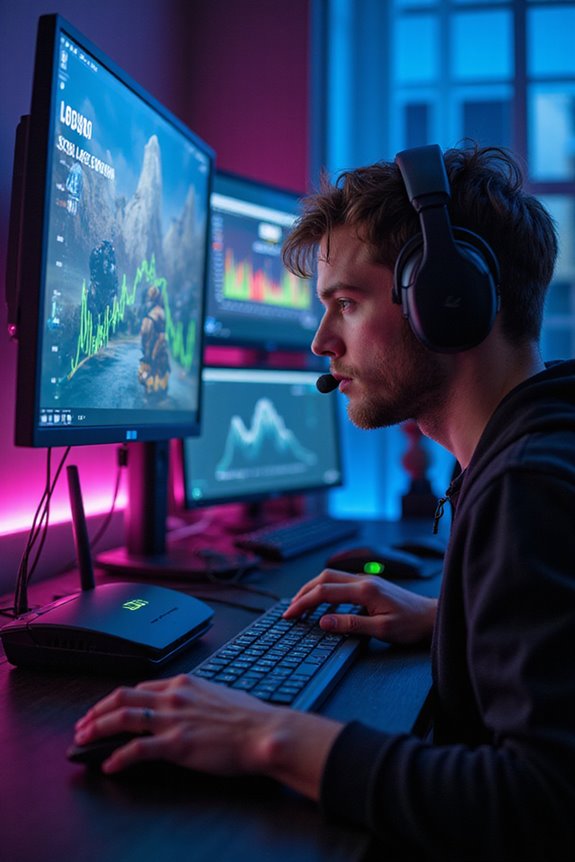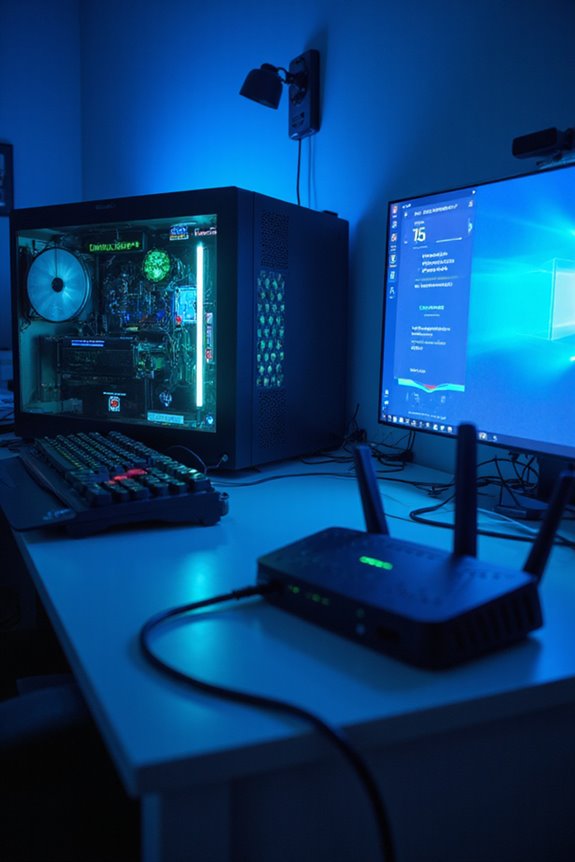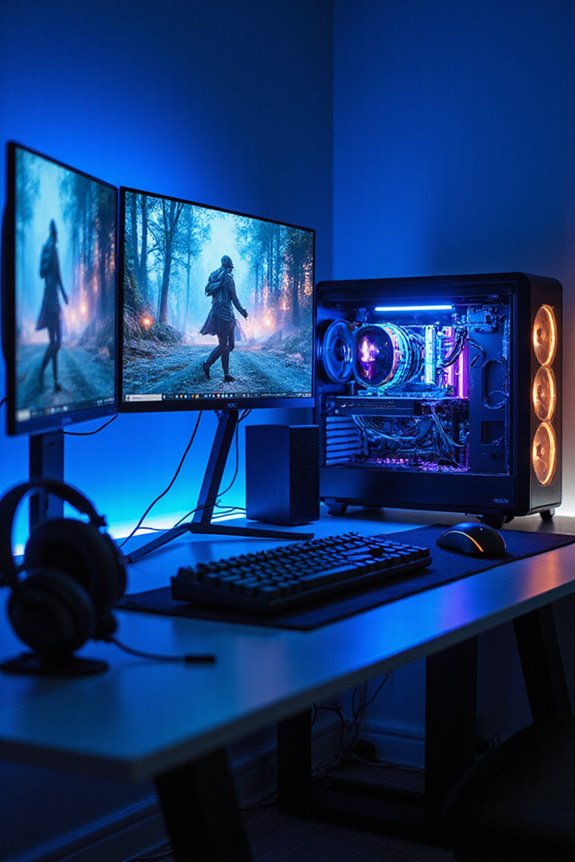To dominate in gaming, I recommend aiming for an upload speed of at least 3 Mbps for competitive play. This guarantees minimal lag and reliable communication, essential for real-time interactions in titles like first-person shooters. Casual gamers might find 1-3 Mbps sufficient, but if you want that extra edge, go for speeds around 6-8 Mbps, especially if streaming. Your router and connection type matter too. Stick around, and I’ll share strategies for optimizing your setup.
Key Takeaways
- Aim for at least 3 Mbps upload speed for competitive gaming to minimize lag and enhance real-time communication.
- For streaming, ensure upload speeds of 5 Mbps for 720p and 7.4 Mbps for 1080p at 60 fps.
- Utilize wired connections over Wi-Fi to achieve better stability and lower latency during gameplay.
- Optimize your network with Quality of Service (QoS) settings to prioritize gaming traffic for improved performance.
- Regularly upgrade your hardware, like routers and Ethernet cables, to maintain peak upload speed and overall gaming experience.
Understanding Minimum Upload Speed Requirements by Platform
Ever wondered what upload speed you really need for gaming? Depending on your platform, the answer varies. For instance, the Nintendo Switch requires just 1 Mbps for casual play, which is pretty decent for multiple players. If you’re on Xbox, you can get by with 0.5 Mbps, although competitive gamers might want a bit more. PlayStation, on the other hand, needs at least 2 Mbps to keep the gameplay smooth and consistent. Steam also sits around 1 Mbps for casual gaming. While casual gaming can function with lower speeds, remember that if you’re aiming for competitive play, you’ll want to aim higher for the best experience. Stability is key, after all!
Factors Influencing Upload Speed Needs in Gaming

While it might seem straightforward, understanding the factors that influence upload speed needs in gaming can really enhance your overall experience. First off, a wired connection often beats wireless, giving you that much-needed stability. Plus, if your router has Quality of Service settings, you can prioritize gaming traffic, making gameplay smoother.
Then there’s your ISP—choosing the right plan is key. A reliable ISP guarantees fewer interruptions, while network congestion during peak hours can really slow things down. Don’t forget your hardware, either; a powerful gaming computer and up-to-date network drivers can greatly improve performance. Finally, consider the type of game you’re playing; multiplayer games demand more upload speed for real-time communication. It’s all interconnected!
Upload Speed Recommendations for Different Gaming Activities

Choosing the right upload speed can make a big difference in how you enjoy various gaming activities. For casual gaming, an upload speed of 1 to 3 Mbps will usually do the trick, but aiming for 3 Mbps or more can elevate your experience. If you’re diving into competitive gaming, you’ll want at least 3 Mbps to keep lag at bay and maintain that responsive gameplay we all crave. When streaming, consider shooting for 5 Mbps for 720p content, or 7.4 Mbps for 1080p at 60 fps. And if you’re into cloud gaming, Microsoft suggests at least 4.5 Mbps for smooth remote play. Just remember, balancing upload speed with low latency is key to keeping the fun going!
The Impact of Upload Speed on Gaming Performance

When it comes to gaming performance, upload speed is more than just a number; it’s a key player in your overall experience. A higher upload speed means your actions get sent to the game server in real-time, reducing lag and giving you that competitive edge in fast-paced multiplayer games. Imagine executing your next move without the dreaded rubber-banding or delays. That smooth communication guarantees your gameplay feels responsive, crucial in genres like first-person shooters or real-time strategy games. On the flip side, low upload speeds can lead to frustrating disconnections and poor performance. So, if you want immersive gameplay and consistent interactions, investing in a solid upload speed is definitely worth considering. After all, who wants to be left behind?
Strategies for Achieving Optimal Upload Speeds

Achieving ideal upload speeds isn’t just about having the fastest internet plan; it involves a combination of smart strategies and the right choices. First, consider optimizing your network. Prioritize gaming traffic using Quality of Service (QoS) settings and keep all devices updated. A wired connection typically offers better stability than Wi-Fi.
If you’re streaming, aim for at least 6-8 Mbps, and don’t forget to monitor your bandwidth—tools like Wireshark can help. Reducing interference from other devices can also make a big difference. Finally, regularly upgrade your hardware, like routers and Ethernet cables, to guarantee peak performance. Remember, it’s not just speed; it’s about creating a seamless gaming experience.
Frequently Asked Questions
How Can I Test My Current Upload Speed?
To test my upload speed, I’ve found tools like TestMy.net and Speedtest by Ookla useful. It’s like checking my pulse; I need to know if my connection’s healthy for everything I do online.
What Devices Affect My Upload Speed During Gaming?
I’ve noticed that my upload speed often dips when multiple devices are connected. My gaming console, smartphone, and smart TV compete for bandwidth, making it essential to manage them for a smoother gaming experience.
Can I Game With Satellite Internet Upload Speeds?
Imagine a ship sailing through stormy seas—gaming on satellite internet feels like that. With upload speeds often lacking, I’ve struggled, but some games still let me navigate those turbulent waters, albeit with patience and strategy.
Does My Router Influence Gaming Upload Speeds?
Absolutely, your router does influence gaming upload speeds. I’ve noticed when I tweak my router settings, the performance improves. Prioritizing my gaming device makes a noticeable difference, especially during those busy hours.
What Are the Signs of Insufficient Upload Speed While Gaming?
Imagine a racehorse struggling to jump hurdles; that’s my experience with insufficient upload speeds. Lag, frozen screens, and poor voice chats steal the thrill. I’m left frustrated, yearning for smooth, uninterrupted gameplay.





